TO BAKER STREET AND BEYOND!
Not to give anything away but the title character in The Man Who Murdered Sherlock Holmes is not Professor Moriarty, “the Napoleon of crime.” In this life-imitates-art parallel to City of Angels and Six Characters in Search of An Author, a character clashes with his creator. So the villain is Sir Arthur Conan Doyle himself! And, indeed, he did attempt to end his greatest triumph. “The Final Problem,” the short story in which Holmes and the fiendish math teacher tumble to doom over the Reichenbach Falls, was meant to be the swan song for the most famous private investigator on Baker Street. No more fiddle playing, pipe smoking or cocaine injections.
But the public’”including Randolph Churchill and his little boy Winston, as well as Doyle’s own relations–would have none of it: By popular demand (and public pressure), a new series of 20th-century tales of Holmes and Watson kept the legend alive and the criminal world in despair.
Doyle’s writers’ block and its successful outcome fuel the pell-mell plot in this absorbing romp from Mercury Theatre. A creation spanning two decades, it’s the last work from the wonderful Julie Shannon, the composer and lyricist who worked in collaboration with book-writer John Reeger to give a grateful Chicago The Christmas Schooner (an annual holiday treat, also at Mercury). Shannon’s untimely demise prevented her from completing The Man Who Murdered Sherlock Holmes–but music director Michael Mahler has seamlessly contributed his own songs and words to Reeger’s libretto. The only thing needed was director Warner Crocker’s worthy work. The result: a delicious 140-minute world premiere that may well sail as often and as far as Schooner.
Reeger drew his inspiration’”and, partially, the plot–from Peter Costello’s The Real World of Sherlock Holmes. Though Doyle based Holmes on a deductive analyst he’d admired from afar, the author might have modeled the crime-solver on himself (as he did Watson, who was also a physician). The musical imagines that, fleeing from the irate fans who vilify him for killing off Holmes (“Look What He’s Done!”), Doyle (Michael Aaron Lindner) leaves behind his ailing wife (McKinley Carter) and flees incognito to the country.
But even in the boonies Doyle’s fame dogs him. So does his craft: His detective instincts and his compassion are triggered by a false accusation. In what would be known as “The Case of The Wyrley Ripper,” Doyle defends George Edalji (Johann George), an Indian-British boy who the town’s suspicious and xenophobic yokels have arrested for a crime right of Equus: He supposedly slit the throats of the county’s horses. Their vicarage vandalized, George’s doting parents, a kindly curate (Anish Jethmalani), who despite his skin, is not a Hindu, and his protective wife (Mary Ernster), are, of course, grateful to Doyle for bringing justice to a very early hate crime. (In theory at least, you could say the Innocence Project starts here.)
But, as Holmes had Watson, Doyle has help’”from a manifestation out of the mist. Sherlock Holmes himself (Nick Sandys) emerges (but no Watson’”there’s room for only one apparition). He has come to plead for his continuation as a character and, rescuing a framed innocent to prove his worth, to gather the clues and expose the lies of the locals. (Naturally, there’s the usual situational humor, a la Topper, Blithe Spirit and Harvey, as Doyle’s harried arguments with Holmes look to everyone else like an argument with air.)
Anyway, the game is again afoot (here modestly called a “flight of fancy”) and a solution to provincial prejudice becomes for this dynamic duo a piece of cake’”and a labor of love. The racial injustice is happily (but not quickly) sorted out: It’s enough to encourage Doyle to return to London and the pen.
Perfectly framed by Scott Davis’s Victorian music-hall proscenium, a capital cast find rollicking fun in this Sherlock spin-off (far better than a recent rotten Toronto import at the Oriental Theatre). As creature and creator, Sandys and Lindner croon out the complexities of their duos “Just Your Ears” and “A Three Pipe Problem.” (Sandys, who was a superb Henry Higgins for Light Opera Works, brings true panache to his talking patter songs straight out of My Fair Lady.) Christina Hall and Matthew Keffer drive home the dangerous ignorance of the Wyrley peasants. As maid and mistress, Colette Todd and McKinley Carter throw themselves into the Gilbert and Sullivan-style “A Trip to the Country.” The ensemble might as well be plated in gold.
Though not as sharp a satire as the similarly-set Gentleman’s Guide to Love and Murder, as “penny dreadful” as Jekyll and Hyde, or as, well, Dickensian as The Mystery of Edwin Drood, The Man Who Murdered Sherlock Holmes is nonetheless a cunning homage and a delightful tour-de-sleuth. Case closed.
photos by Brett A. Beiner
The Man Who Murdered Sherlock Holmes
Mercury Theater Chicago
3745 North Southport Avenue
Wed at 7:30; Thurs at 3 and 7:30;
Fri at 8; Sat at 3 and 8; Sun at 3 and 7:30
ends on March 20, 2016
for tickets, call 773.325.1700 or visit Mercury Theater
for info on Chicago Theater, visit Theatre in Chicago
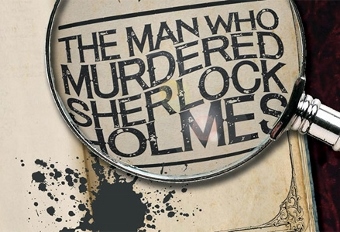
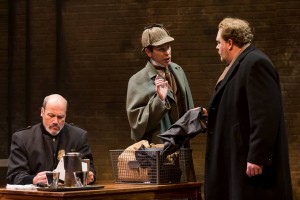

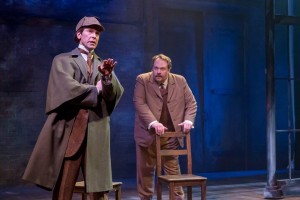
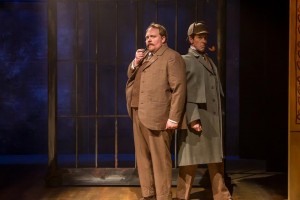
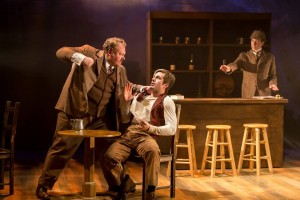
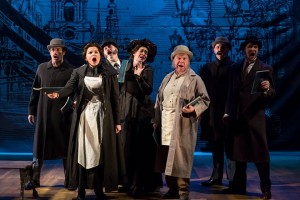
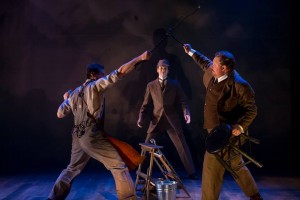
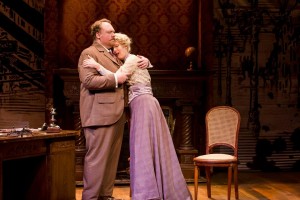
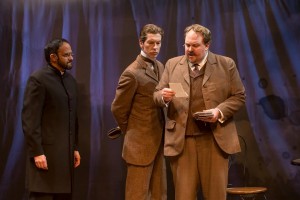
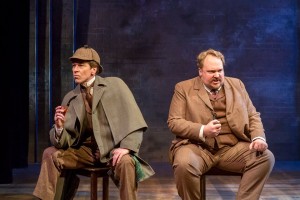
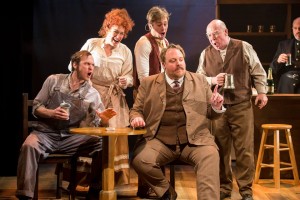
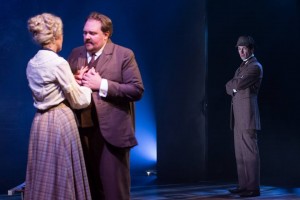

{ 2 comments… read them below or add one }
A correction: John Reeger is married to Paula Scrofano. Bill Geller was married to the late, glorious Julie Shannon.
Thanks, Naomi – Stage and Cinema regrets that error. It has been corrected!